Cthulhu Has Risen…
Anticipating CTHULHU’S REIGN (Part 3 of 3) 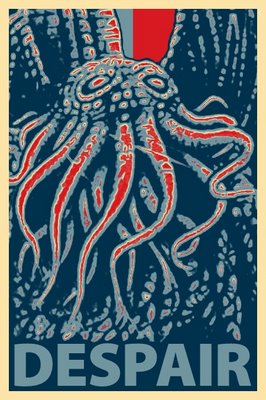
“You made me master of the world where you exist
The soul I took from you was not even missed.”
–Black Sabbath, “Lord of This World”
“The process of delving into the black abyss is to me the keenest form of fascination.”
–H. P. Lovecraft
At last, the stars are right.
The long-anticipated horror anthology CTHULHU’S REIGN finally hits stores this week, and the world of Lovecraft-inspired fiction will never be the same.
Last week I interviewed a few of the authors who contributed to the collection. In this third and final installment of “Anticipating CTHULHU’S REIGN“ several more Architects of the End have shared with me the dark secrets behind their stories.
Although these 15 tales share a common concept (Great Cthulhu rising up to reclaim the world for the Old Ones), there is a wide array of story types and styles at play here, from cosmic adventures to philosophical nightmares, to humanistic stories of survival in a world gone mad, and more. The sheer diversity of storytelling in this single volume is stunning–a testament to the anthology-building skills of editor Darrell Schweitzer. Yes, there are some experimental pieces in CTHULHU’S REIGN, but there is just as much old-school Weird Tales flavor, which makes for a delicious blend of horror and strangeness.
Richard Lupoff’s “Nothing Personal” takes a science-fiction approach to horror. “The first decision I had to make was, Will this be a science fiction story or a supernatural fantasy? I then referred back to an earlier story of my own, utilizing the theme of a distant planet that had gone undiscovered because its orbit is at right angles to the plane of the ecliptic, and moved on from there.” That planet is Yuggoth, which (like its grotesque inhabitants) is composed entirely of antimatter.
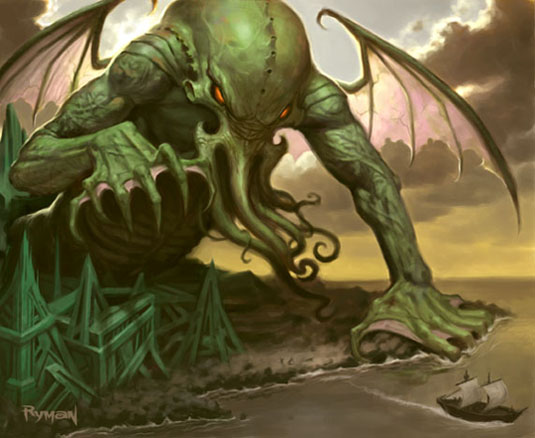 Lupoff sees Lovecraft’s monsters (including his own Yuggothi) as bizarre aliens rather than supernatural creatures. “In Lovecraft’s work, humans worship Cthulhu, and Lovecraft himself uses the term ‘gods’ in referring to some of the alien creatures in his stories,” he says. “But I think his use of the term was metaphoric and the aliens, while super-powerful, were not actually supernatural.”
Lupoff sees Lovecraft’s monsters (including his own Yuggothi) as bizarre aliens rather than supernatural creatures. “In Lovecraft’s work, humans worship Cthulhu, and Lovecraft himself uses the term ‘gods’ in referring to some of the alien creatures in his stories,” he says. “But I think his use of the term was metaphoric and the aliens, while super-powerful, were not actually supernatural.”
While his story compares mankind to a “virus” ironically threatening an alien world, Lupoff is more concerned with entertainment than philosophy. “I don’t consider myself a great moralist or teacher. My stories are written to entertain. But I suppose a certain philosophical theme will inevitably find its way into most stories. In the case of ‘Nothing Personal’ the theme is that one should fight back against tyranny no matter how great the odds, and ultimately, if necessary, to end, if one must, with the proverbial bang, not a whimper.”
Don Webb’s “Sanctuary” looks at Cthulhu’s rise and the ensuing chaos from a southwestern viewpoint. A group of Texas survivors have done their best to resist the horrid changes that are warping their world…but how long can they resist the inevitable? 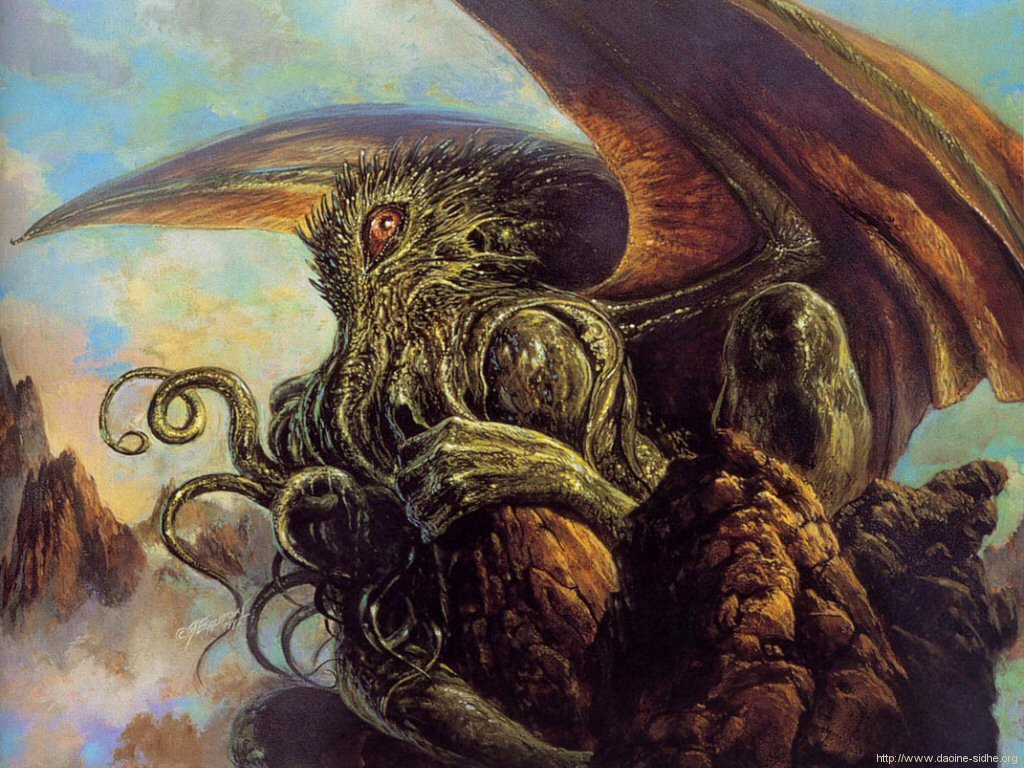
“I wanted to deal with Texas goodness,” Don says. “Central Texas folk do show love and community. I wanted to contrast that not with ‘evil’ or any mundane human concept, but with true strangeness. Not human strangeness but the forces of an entirely different way of doing things. In the fist half [of the story] I show myself to be more pro-life than Lovecraft, but in the latter I am trying to achieve the Cosmic with such skill as I may call my own.”
Don says that what passes for reality has worn very thin in today’s world. “I feel the fact that most humans live in Plato’s cave is as sad and disturbing as pollution. It is time to take what humans do that is good and take it to a new plane of being. I am all for the Old Ones’ return. Hail the Ancient Dreams!”
“Sanctuary” echoes with religious overtones, but even religion itself has been twisted into something strange and inhuman. “I love the notion of people using the half-baked and sterile esotericism of conspiracy theory or Simon’s Necronomicon as lenses to view what is truly beyond human ken. The idea of the world without a veil has haunted the religions of ending. Life is what happens afterward anyway, and I was tickled pink to show my afterward.”
Will Murray’s “What Brings the Void” chronicles the mission of a telepathic spy Working to defy the terrible power of Cthulhu and the Old Ones. This nameless operative is an agent of the Cryptic Events Evaluation Section of the National Reconnaissance Office, an agency Murray has written about in two previous tales. 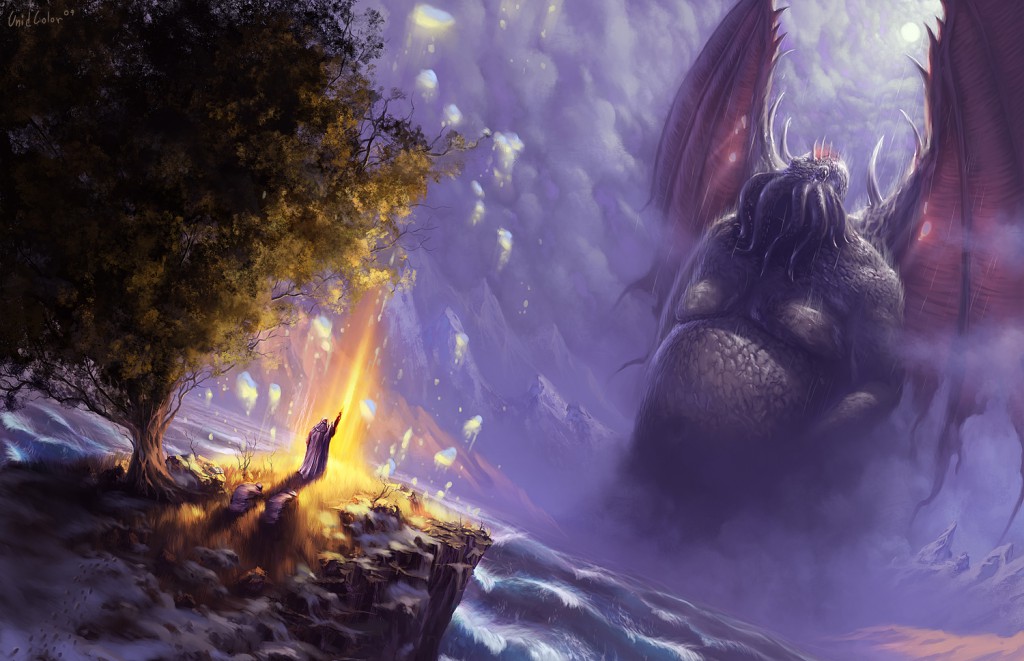
“I set the story in Richmond, Virginia, because it was near Washington, DC,” Will says. “I had also recently experienced a couple of very weird Lovecraftian-type dreams that had stayed with me, and used one for the opening scene, and the other–the demon face in the sky–later in the tale.”
Will says his title comes from William James’s unhappy observation: “Our hour of triumph is what brings the void.” He knew it would be fun to careen past the terminal climax of his typical stories into the realm of what lay beyond the Old Ones’ triumph. “My first order of business was to set the post-human stage and introduce my protagonist, [so] I jumped in, tasked my hero, and let him go where he would. That usually works for me, and it did this time. My training as a remote viewer gave me a unique POV and a lot of the technical stuff.”
With a psychic protagonist who reads the very thoughts and minds of the Old Ones and their monstrous minions, the tale explores some truly bizarre mental and spiritual concepts. “The only theme, if you want to call it that,” Will says, “is this: If Earth is lost to Man, and there exists no hope, what further horrors could possibly be encountered? I found the absolute ultimate one.”
Ken Asamatsu brings a Japanese perspective to CTHULHU’S REIGN, with “Spherical Trigonometry,” a tale of angular obsession and global apocalypse. Asamatsu’s chilling story was translated by Edward Lipsett. “I was astonished when I heard the setting would be after Cthulhu returned,” says Asamatsu of the anthology. “It shattered some preconceptions I had. I had been thinking the Cthulhu Mythos was a sort of Armageddon setting, and it was a shock to be asked to write it up like sort of a dystopian novel. It was a heck of an impact, and once I snapped out of it I wondered what sort of person could come up with such an idea.”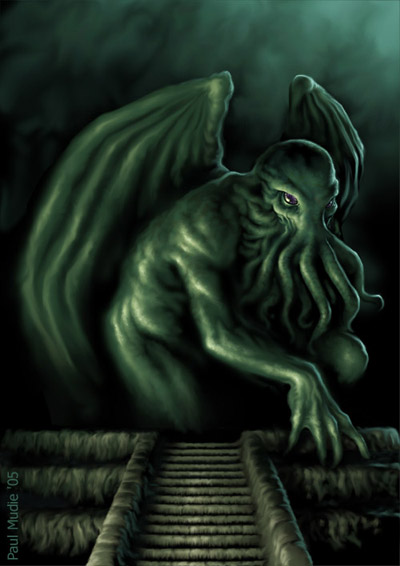
One of the things Asamatsu enjoyed about writing “Spherical Trigonometry” was being able to (fictionally) destroy Tokyo City Hall. “It must be one of the most hideous buildings in the world, and surely an affront to almost any god,” he says. “Cthulhu tears down the City Hall, the mayor and all the civil servants there get turned into crab-thingies who can’t use Japanese, or even English or Chinese or Korean, and just have to communicate by clacking their claws.”
Asamatsu drew insipration from Frank Belknap Long’s “The Hounds of Tindalos,” (1931) embracing the deadly angles of that tale. “I thought it was a brilliant idea to explain the structure of the universe using a conflict between curves and angles. That story has had an effect on occultists as well, and I was astonished when I discovered a occult ‘text’ using Long’s prose just as he originally wrote it! I thought maybe I had found one of the sourcebooks he used to write the story, but he wrote his story much earlier.
“In any case, the theme of this story was, I suppose, the fact that we puny human beings have no recourse but to escape into sex–or death–when faced with the extinction of the human race. I think it was Ingmar Bergman who said he didn’t believe in anything but sex and death. I wonder if the seeds of the extinction of the human race, and the earth itself, hadn’t already grown to maturity in the depths of that Swedish genius.”
Asamatsu expressed his sincere appreciation of editor Darrell Schweitzer, “who was kind enough to allow a poor author in this island corner of the Orient the opportunity to destroy the world.”
Gregory Frost’s “The Seals of New R’lyeh” finds two con-men hoping to pull off the ultimate scam…stealing from Cthuhu himself. Frost was inspired by certain tales from legendary crime writer Donald Westlake. “The one thing I knew absolutely was that I wasn’t going to play straight with the material–I just don’t have it in me to believe in the cosmic dread of H.P. Lovecraft. My favorite Westlake novels and stories are the comic ones featuring his character Dortmunder, the first of which is ‘The Hot Rock’. Dortmunder’s this brilliant caper mastermind who is perpetually unlucky where his schemes meet reality. And I decided for this anthology I would write a Dortmunder story.”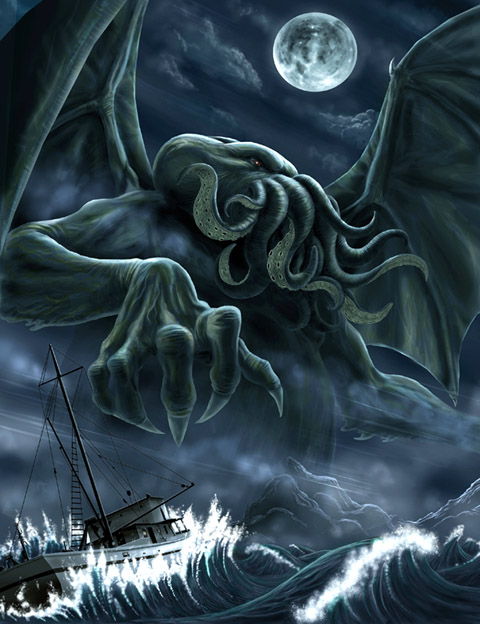
Greg carefully crafted his tale to recreate the Westlake style. “That was also the most challenging part of it, the deadpan delivery that Westlake could craft to perfection is so wonderful,” he says. “If I have caught half of it, I’ll be insanely pleased.”
The resulting tale is a heist story ripe with Lovecraftian irony. “I read a lot of Lovecraft and Clark Ashton Smith and their spawn back in my misspent youth, and my general sense of the characters in those stories was that they were the worst apostles imaginable,” Greg says. “They fumbled nearly every opportunity to let the Old Ones in. [In this story] what’s intended to be a grand scam–pretending to be Cthulhian worshippers in order to rip off the real worshippers–ends up letting the unspeakable creature into our world. Our hapless criminal heroes do what no one bent on opening the gates has managed to do–usher in life under Cthulhu, which is the theme of the anthology after all.”
Editor Darrell Schweitzer also contributed a chilling original story called “Ghost Dancing.” His main goal with this anthology was to explore an aspect of the Cthulhu Mythos which others have more or less shied away from, and he says the wide range of stories surprised him. “The Laird Barron and the Fred Chappell [stories] are probably the most unorthodox of the lot. I definitely wanted something more than pastiches in the August Derleth or Lin Carter mode. I didn’t have a strict ‘bible’ for this book, assigning each contributor a theme or subject. I wanted to let them be as creative as they could be.” The result is an expansive, diverse, and eclectic mix of tales, all grown from the same conceptual seed.
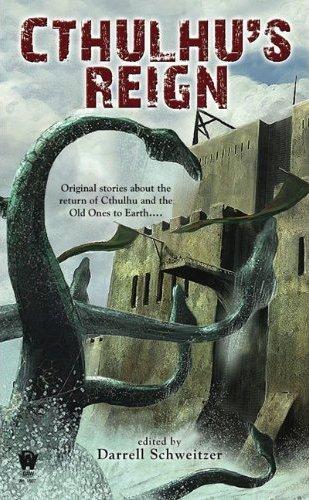
“Ghost Dancing” was Darrell’s attempt at filling in an important gap in the book: “Nobody wrote a story explicitly describing the rising of R’lyeh in the South Pacific or the actual emergence of Cthulhu, and nobody quite dealt with how the Cthulhu cultists would cope with the Big Day,” he says. “So I waded in myself and combined both of these essential elements in a modestly short story. Somebody had to do it.” Darrell drew on his own youthful memories for the story’s northeastern setting. “The descriptions of the Maine coast, particularly the area a little north of Camden are memories from my youth. I did indeed vacation there every summer. I did not ever actually enter the house described, and, no, I never belonged to a human sacrifice cult in those days. Honest.”
Choosing the final reading order of the 14 stories and one novella was rather easy, Darrell says. “The progression is from small scale to large. The last two (Lupoff and Chapell) wipe the Earth clean of all human life, albeit in different ways. It would be hard to do a follow-up to that, so those stories had to come last. There is also the basic principle that you want to have the reader go away with a strong impression, so it is usually best to end a magazine issue or an anthology with a powerful, long piece. It’s where you put your novella. The Chappell is also the longest story in the book, so it obviously should go last.”
Darrell’s introduction warns: “I suppose I should warn you that this isn’t a very cheerful book, what with all that cosmic nihilism inherent in the Lovecraft worldview.” However, Fred Chappell’s concluding novella, “Remnants,” manages to inject a ray of celestial light into the dark universe of death and madness that most of the book evokes. There are also excellent stories by Jay Lake and John Langan.
Overall, CTHULHU’S REIGN is horror fan’s dream (or nightmare, depending on your point of view), and one that goes far beyond its Lovecraftian origins. These are tales that incite the mind and provoke the spirit…excursions into weird realms that will not be easily forgotten.
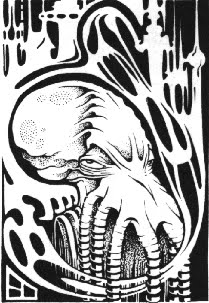 To quote Darrell’s intro again: “What these stories do is go bravely where few others have, following the Cthulhu Mythos to its ultimate, logical conclusion.”
To quote Darrell’s intro again: “What these stories do is go bravely where few others have, following the Cthulhu Mythos to its ultimate, logical conclusion.”
Even when that conclusion is well beyond any logic the frail human mind can comprehend.
The weirder, the better.
–John R. Fultz, 2010
[…] Cthulhu Has Risen… — Black Gate reviews Cthulhu’s Reign, in which I have a story. […]
[…] si conclude con un tono ironico degno dello scrittore Ken Asamatsu la sua intervista, assolutamente da leggere, pubblicata sul sito di Black Gate Magazine in occasione della […]
John,
Kudos on a great series of articles! This is one of the most ambitious pieces we’ve published since… well, SKULLS. 🙂 And you pulled it off brilliantly.
You’ve really whet (whetted? whetten? made more whet?) my appetite for the book. Can’t whait to read it!
John
Hey JRF,
Just got a copy today. Looks great. I haven’t read any bona fide Yog-Sothothery in some long time.
Want to read your tale first, but I probably ought to read them in order out of respect for the editor’s Grand Design and all that.
Hey, John!
Actually, the stories don’t have to be read in any particular order…it’s not really a “shared world” anthology. The world is destroyed in several different and conflicting ways, which is a cherry thought. 🙂 But if you go in order of Darrell’s choosing, you go from small-scale destruction to large-scale destruction. So feel free to read it in any order you like–that’s what I usually do with anthologies–I like to skip around usually.
However, I must say that Ian Watson’s “The Walker in the Cemetery” (first story in the book) is truly a skin-crawling and bone-chilling experience. It may be that those horror tales with the smaller scale are inherently more “disturbing” BECAUSE of that smaller, human-centered scale. Just a thought…but all the stories here are winners.
Enjoy!
Releasing my Resin toy of Cthulhu soon!
Check here for updates and the release: http://imperfecz.blogspot.com/
[…] John R. Fultz interviewed the authors behind the landmark anthology Cthulhu’s Reign in “Cthulhu Has Risen…”, perhaps the single most popular blog post we’ve ever published, and last year he examined a […]